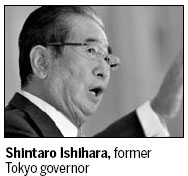Tokyo governor quits to form new party

Ishihara plans to get back to national politics
Tokyo Governor Shintaro Ishihara, whose bid to "purchase" the Diaoyu Islands ignited a row between Japan and China, resigned on Thursday to form his own national political party.
His resignation came as an analyst warned that the rise of right-wing forces in Japan should be closely watched for possible moves that could lead to a deterioration in already-strained Sino-Japanese ties.
Ishihara said at a news conference he is planning to "return to national politics" and that Japan's pacifist post-war constitution was "ugly" and needs to be reframed, AFP reported.
Japanese newspaper The Yomiuri Shimbun earlier reported that Ishihara will co-opt members of the tiny right-wing Sunrise Party for his new venture and seek to join hands with Osaka Mayor Toru Hashimoto, who has formed the Japan Restoration Party, aiming to seize control of the lower house.
Ishihara announced in April he wanted to "buy" the group of uninhabited but strategically important islands in the East China Sea and amassed $17.5 million in public donations for the Tokyo government to "acquire" them.
The plan was used by Ishihara to win political power, analysts said.
"In announcing the plan to 'buy' the Diaoyu Islands, Ishihara's real aim is to go for Japanese national politics and hope to influence the country's future," said professor Wang Xinsheng of the history department at Peking University.
Wang said Ishihara has chosen a good time to increase his influence, as people in Japan feel disappointed with the two major parties, with the nation going through difficult times while its neighbor China develops rapidly.
Ishihara, an 80-year-old novelist-turned-politician, in February denied that the 1937 Nanjing Massacre took place.
AFP reported that Ishihara, elected for a fourth four-year term as Tokyo governor in April 2011, said he saw much wrong with national politics.
"There are several contradictions, big contradictions, that we hope the state itself will solve," he told reporters, quoted by the news agency.
"One contradiction, bigger than anything, is the Japanese constitution, which was imposed by the (post World War II) US occupying army," he said.
Many right-wing Japanese politicians, including Ishihara, object among other things to Article 9 of the constitution, which bars Japan from waging war.
Wang Ping, a researcher on Japanese studies at the Chinese Academy of Social Sciences, said Japan's right-wing politicians are a force that cannot be ignored, as they have the power to influence the country's legislation and government policy-making.
China should stay on high alert over the words and actions of such people "for their plots to sabotage Sino-Japanese relations and split China," Wang wrote in a recent article.
However, Zang Zhijun, a professor of Japanese studies at Fudan University in Shanghai, said the new party Ishihara wants to form will not take many seats and will only be a small force.
"He is desperate to play the last weight on his balance to win," said Zhang.
Ishihara's son, 55-year-old Nobuteru Ishihara, lost the Liberal Democratic Party leadership race to former Japanese premier Shinzo Abe on Sept 26.
Contact the writers at chengguangjin@chinadaily.com.cn and zhangyunbi@chinadaily.com.cn


















